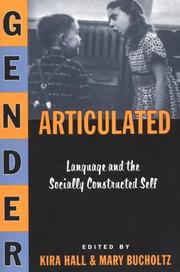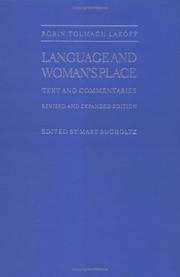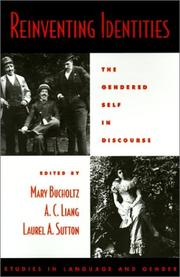| Listing 1 - 10 of 16 | << page >> |
Sort by
|
Book
ISBN: 9780521692045 0521692040 9780521871495 9780511975776 9780511933486 0511933487 9780511930782 051193078X 9780511928253 0511928254 0511975775 0511925743 9780511925740 0521871492 110721873X 1282930834 9786612930836 051193212X 9781282930834 6612930837 Year: 2011 Publisher: Cambridge : Cambridge University Press,
Abstract | Keywords | Export | Availability | Bookmark
 Loading...
Loading...Choose an application
- Reference Manager
- EndNote
- RefWorks (Direct export to RefWorks)
In White Kids, Mary Bucholtz investigates how white teenagers use language to display identities based on race and youth culture. Focusing on three youth styles - preppies, hip hop fans, and nerds - Bucholtz shows how white youth use a wealth of linguistic resources, from social labels to slang, from Valley Girl speech to African American English, to position themselves in the school's racialized social order. Drawing on ethnographic fieldwork in a multiracial urban California high school, the book also demonstrates how European American teenagers talk about race when discussing interracial friendship and difference, narrating racialized fear and conflict, and negotiating their own ethnoracial classification. The first book to use techniques of linguistic analysis to examine the construction of diverse white identities, it will be welcomed by researchers and students in linguistics, anthropology, ethnic studies and education.
Teenagers --- Youth, White --- Language and culture. --- Whites --- Language. --- Race identity --- Children, White. --- Culture and language --- Culture --- White children --- Language and culture --- White Youth --- Adolescents --- Teen-agers --- Teens --- Young adults (Teenagers) --- Youth --- White people --- White persons --- Ethnology --- Caucasian race --- Arts and Humanities --- Language & Linguistics --- Blancs --- Langage et culture --- San Francisco, Baie de (États-Unis) --- Langage --- Identité collective --- San Francisco, Baie de (États-Unis) --- Identité collective
Digital
ISBN: 9780511975776 Year: 2011 Publisher: Cambridge Cambridge University Press
Abstract | Keywords | Export | Availability | Bookmark
 Loading...
Loading...Choose an application
- Reference Manager
- EndNote
- RefWorks (Direct export to RefWorks)

ISBN: 0415913985 Year: 1995 Publisher: New York ; London Routledge
Abstract | Keywords | Export | Availability | Bookmark
 Loading...
Loading...Choose an application
- Reference Manager
- EndNote
- RefWorks (Direct export to RefWorks)
Seksisme in de taal --- Sexism in language --- Sexisme dans le langage --- Language and languages --- -Sexism in language --- Women --- -#SBIB:309H517 --- #SBIB:309H511 --- Human females --- Wimmin --- Woman --- Womon --- Womyn --- Females --- Human beings --- Femininity --- Sexist language --- Language and sex --- Nonsexist language --- Foreign languages --- Languages --- Anthropology --- Communication --- Ethnology --- Information theory --- Meaning (Psychology) --- Philology --- Linguistics --- Sex differences --- Language --- Verbale communicatie: sociale psychologie van de taal en de interactie, psycholinguistiek --- Verbale communicatie: algemene pragmatiek, stilistiek en teksttheorie, discoursanalyse --- #SBIB:309H517

ISBN: 0415913993 Year: 1995 Publisher: New York, N.Y. Routledge
Abstract | Keywords | Export | Availability | Bookmark
 Loading...
Loading...Choose an application
- Reference Manager
- EndNote
- RefWorks (Direct export to RefWorks)
Sociolinguistics --- United States --- United States of America --- Race --- Family --- Female homosexuality --- Power --- Language use --- Linguistics --- Theory --- Internet --- Book --- Sex differences --- Gender expression
Digital
Abstract | Keywords | Export | Availability | Bookmark
 Loading...
Loading...Choose an application
- Reference Manager
- EndNote
- RefWorks (Direct export to RefWorks)

ISBN: 0195167570 0195167589 9786612366987 9786610535453 1280535458 128236698X 019534717X 0199883300 9780195347173 0197721869 Year: 2023 Publisher: New York ; Oxford University Press,
Abstract | Keywords | Export | Availability | Bookmark
 Loading...
Loading...Choose an application
- Reference Manager
- EndNote
- RefWorks (Direct export to RefWorks)
Widely recognized as having inaugurated feminist research on the relationship between gender and language, this revised edition includes an introduction and annotations by the author in which she reflects on some of the most widely discussed issues it raises.
English language --- Sex role. --- Sexism in language. --- Women --- Sex differences. --- Language. --- Sexist language --- Language and sex --- Language and languages --- Nonsexist language --- Gender role --- Sex (Psychology) --- Sex differences (Psychology) --- Social role --- Gender expression --- Sexism --- Social aspects --- Sex differences --- Germanic languages --- Gender roles --- Gendered role --- Gendered roles --- Role, Gender --- Role, Gendered --- Role, Sex --- Roles, Gender --- Roles, Gendered --- Roles, Sex --- Sex roles
Book
Year: 2004 Volume: 3 Publisher: New York : Oxford University Press,
Abstract | Keywords | Export | Availability | Bookmark
 Loading...
Loading...Choose an application
- Reference Manager
- EndNote
- RefWorks (Direct export to RefWorks)
Women --- Sex role. --- Sexism in language --- English language --- Femmes --- Rôle selon le sexe --- Sexisme dans le langage --- Anglais (Langue) --- Language --- Sex differences --- Langage --- Différences entre sexes

ISBN: 1280471816 1423738764 0195352149 1602563330 9781423738763 9780195126297 0195126297 9780195126303 0195126300 9786610471812 6610471819 0195126297 0195126300 9780195352146 019772230X Year: 1999 Publisher: New York Oxford University Press
Abstract | Keywords | Export | Availability | Bookmark
 Loading...
Loading...Choose an application
- Reference Manager
- EndNote
- RefWorks (Direct export to RefWorks)
Talk is crucial to the way our identities are constructed, altered, and defended. These essays bring together feminist scholars in the area of language and gender to tackle such topics as African-American drag queens, gender and class on the shopping channel, and talk in the workplace.
Language and languages --- Gender identity. --- Sex identity (Gender identity) --- Sexual identity (Gender identity) --- Identity (Psychology) --- Sex (Psychology) --- Queer theory --- Language and sex --- Sexism in language --- Sex differences. --- Pragmatics --- Sociolinguistics --- Gender dysphoria
Book
ISBN: 9780807781050 9780807767016 Year: 2022 Publisher: New York Teachers College Press
Abstract | Keywords | Export | Availability | Bookmark
 Loading...
Loading...Choose an application
- Reference Manager
- EndNote
- RefWorks (Direct export to RefWorks)
Talking College shows that language is fundamental to Black and African American culture and that linguistic justice is crucial to advancing racial justice, both on college campuses and throughout society. Writing from a linguistics-informed, Black-centered educational framework, the authors draw extensively on Black college students' lived experiences to present key ideas about African American English and Black language practices. The text presents a model of how Black students navigate the linguistic expectations of college. Grounded in real-world examples of Black undergraduates attending colleges and universities across the United States, the model illustrates the linguistic and cultural balancing acts that arise as Black students work to develop their full linguistic selves. Talking College provides Black students with the knowledge they need to make sense of anti-Black linguistic racism and to make decisions about their linguistic experiences in college. It also offers key insights to help college faculty and staff create the liberating and linguistically just educational community that Black students deserve. Book Features: Weaves together information and approaches drawn from the authors' extensive experience working with Black and other students of color in higher education. Provides an up-to-date discussion of Black language practices and their role in Black students' college experiences. Discusses the racial politics of language, including anti-Black linguistic racism and the struggle for linguistic justice as part of racial justice. Offers a detailed model of Black college students' diverse linguistic and racial identities. Outlines concrete steps toward racial and linguistic justice that students and faculty can take today. Accessible to students and faculty without a background in linguistics, while also engaging and informative for linguistics scholars.
Book
ISBN: 9780197755259 9780197755266 Year: 2024 Publisher: New York : Oxford University Press,
Abstract | Keywords | Export | Availability | Bookmark
 Loading...
Loading...Choose an application
- Reference Manager
- EndNote
- RefWorks (Direct export to RefWorks)
Decolonizing Linguistics, the companion volume to Inclusion in Linguistics, is designed to uncover and intervene in the history and ongoing legacy of colonization and colonial thinking in linguistics and related fields. Taken together, the two volumes are the first comprehensive, action-oriented, book-length discussions of how to advance social justice in all aspects of the discipline.
| Listing 1 - 10 of 16 | << page >> |
Sort by
|

 Search
Search Feedback
Feedback About UniCat
About UniCat  Help
Help News
News